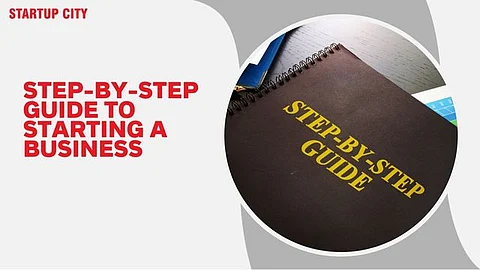

Embarking on the entrepreneurship journey and starting your own business is an exciting and rewarding endeavour. However, it requires careful planning, thorough research, and precise execution to lay a strong foundation for success.
We present to you a comprehensive and highly optimised step-by-step guide to help you navigate the process of starting a business in the dynamic landscape of India.
The first step in starting a business is brainstorming and identifying a viable business idea. Conduct market research to assess the demand for your product or service and validate your concept.
Understand your target audience and identify pain points that your business can address effectively. This initial groundwork is crucial to ensuring that your business idea has the potential for success.
A well-crafted business plan acts as a roadmap for your entrepreneurial journey. Outline your business objectives, target market, competitive analysis, and revenue model.
Define your brand identity, mission, and vision to create a strong brand presence in the market. Your business plan will serve as a guiding document as you progress in your entrepreneurial venture.
Selecting the right business structure is essential for legal and financial reasons. In the Indian subcontinent, common business structures include sole proprietorship, partnership, limited liability partnership (LLP), private limited company, and public limited company.
Register your business with the appropriate government authorities and obtain the necessary licenses and permits to ensure compliance with the law.
Determine the financial requirements of your business and explore funding options.
Whether through personal savings, loans, angel investors, venture capital, or crowdfunding, choose the funding avenue that aligns with your business needs and long-term vision. A solid financial plan will help you manage your finances efficiently.
Develop your product or service focusing on quality, innovation, and customer satisfaction. Conduct prototypes and test your offerings to gather feedback and make necessary improvements. Delivering value to your customers is paramount in gaining a competitive edge in the market.
Craft a robust marketing strategy to promote your business and reach your target audience.
Utilise digital marketing channels such as SEO, social media marketing, content marketing, and email marketing to build brand awareness and engage with potential customers. Invest in impactful branding to create a lasting impression in the minds of your audience.
Ensure legal compliance by adhering to taxation regulations, labour laws, and data protection regulations. Draft comprehensive contracts for your employees, suppliers, and customers to protect your business interests and maintain transparency in your relationships.
Effective financial management is critical for the success and sustainability of your business. Implement robust accounting systems and regularly monitor financial performance. Keep a close eye on expenses, cash flow, and profitability to make informed business decisions.
Develop a sales strategy to drive revenue and expand your customer base. Identify the most effective sales channels and build strong relationships with your customers. Provide excellent customer service to foster loyalty and positive word-of-mouth recommendations.
As your business gains traction, devise strategies for scaling and expansion. Explore new markets, diversify your product offerings, and invest in talent and technology to support growth. Continuous innovation and adaptation to changing market trends are crucial for sustained success.
Embarking on the journey of starting a business in India requires dedication, perseverance, and a well-thought-out plan.
By following this step-by-step guide and incorporating the optimised keywords relevant to India, you will be better equipped to overcome challenges and pave the way for a successful and thriving entrepreneurial venture.
Remember that each step requires meticulous attention and continuous learning, as entrepreneurship is a dynamic and evolving process. With a passion for your business idea and a commitment to excellence, you can navigate the path to business success in this vibrant and diverse region.